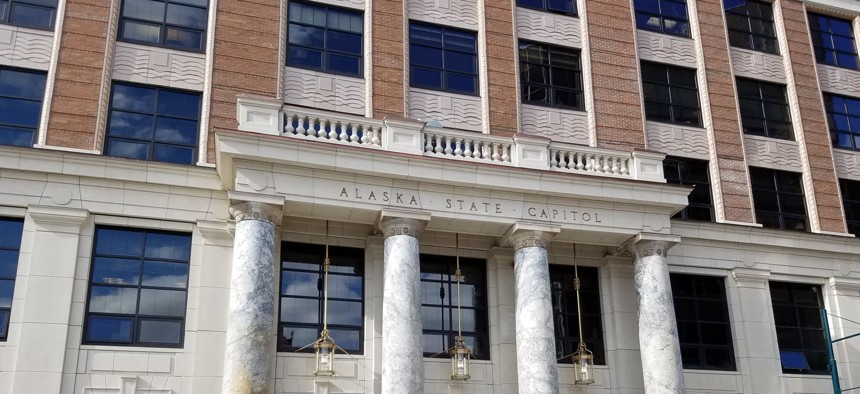‘We Can’t Fix Alaska on Cuts Alone’

The Alaska State Capitol in Juneau Michael Grass / Route Fifty

Connecting state and local government leaders
With his state on shaky fiscal ground, Gov. Bill Walker is trying to thaw the ice as deadlocked legislative leaders try to resolve their differences and find a way to generate new revenue.
This is the third in a series of Route Fifty dispatches from Alaska.
JUNEAU, Alaska — Among the 50 states, Alaska is the only one that lacks both an income tax and a sales tax. That unique situation is due in part to the Last Frontier’s bounty of revenue-generating energy resources that have helped pay the bills over the years plus provide each resident with an annual dividend through the Alaska Permanent Fund.
But it’s also put Alaska in a vulnerable fiscal position. Shifts in global energy markets and declining oil prices have sent the state into a recession. There have been annual budget deficits since 2012 and this year’s gap is around $3 billion.
Gov. Bill Walker, an Independent, wants his state to regain a stable budgetary footing, moving beyond short-term fixes and toward long-term fiscal sustainability. “It’s time to remove the uncertainty,” the governor said during a press conference on Tuesday at the State Capitol. “It’s time to get on with our future.”
The past few days in Juneau have been important ones for Alaska’s fiscal future. On Saturday Alaska’s House—led by a Democratic majority that includes a handful of Republicans and Independents—approved an income tax that’s part of a larger budget package that includes restructuring the Permanent Fund.
But leaders in the Republican-controlled Senate have called the House’s plan a non-starter. Senate President Pete Kelly of Fairbanks said that taxing state residents during a recession is “absurd on its face,” according to Alaska Public Media.
With the two legislative chambers stuck on a way forward, Walker will sit down with House and Senate leadership on Wednesday to continue budget talks, using the Governor’s Mansion as neutral ground.

“The uncertainty that hangs over Alaska is only going to be removed if we finish this plan and if we finish it this year,” Walker said during his press conference.
The governor, who pressed for an income tax last year, has voiced his support for the House’s proposed Education Funding Act.
“I do support what they did on Saturday. I do support a broad-based tax and the Educational Funding Act is the only broad-based tax that we have on the table today,” Walker said. “That’s different than what we’ve had before.”
The governor said that the budget solution can’t rest on simply cutting spending, something some Republicans have called for.
“There’s a lot of discussion about what government waste is and what wasteful spending is. I believe that wasteful spending is not feeding hungry kids. Taking care of seniors is not waste. Funding state troopers is not waste. Keeping public schools open, plowing highways and fixing bridges is not waste,” he said. “We can’t fix Alaska on cuts alone.”
In an interview with Route Fifty on Tuesday, Rep. Jonathan Kreiss-Tomkins, a Democrat from Sitka, said the Senate hasn’t offered a reasonable plan and “has gotten its hand singed talking about specifics.”
He continued: “There’s no other proposal I have seen that both solves the math problem and passes the red-face test of plausibility.”
With the Alaska Senate opposed to the House’s plan, what’s a potential path forward toward compromise?
As the Alaska Dispatch News reported Tuesday:
Both sides support a restructured Permanent Fund, which they're counting on to fill the bulk of Alaska's deficit of more than $2.5 billion. They're split on the income tax legislation and on raising taxes on oil companies, but they also both appear willing to consider the elimination of cash subsidies for North Slope oil companies.
The income tax could be replaced by a different proposal more palatable to the Senate majority, like a statewide sales tax or an increase to Alaska's gasoline tax, [Democratic Sen. Bill] Wielechowski said.
Walker said he hopes he can thaw the ice.
“We need to pull this together. I’m more than willing to be in that role and in that position to make that happen,” the governor said. “These are very sobering times, times of making a series of difficult decisions.”
Michael Grass is Executive Editor of Government Executive’s Route Fifty and is based in Seattle.

NEXT STORY: Taxing the New Economy, Starting With Uber, Lyft





